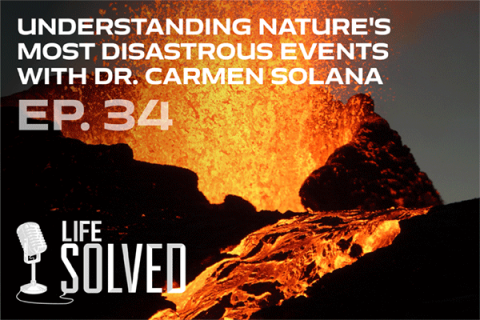

Working with communities in the wake of natural disasters, to help prevent tragedy
17 min listen
Life Solved Podcast - Understanding Nature's Most Disastrous Events with Dr Carmen Solana
Can you imagine living at the foot of a volcano, or in the path of extreme storms? Plenty of communities around the world live with the potential of a natural disaster taking place on home turf. That’s why early warning systems and robust research can make the difference between life and death.
In this episode of Life Solved, Dr Carmen Solana shares her experiences of researching hurricanes and lava flow and interpreting the data to work hand in hand with communities at threat.
You can listen to Life Solved on all major podcast players, whether via Apple, Spotify, Google Podcasts or other apps. Just search for 'Life Solved' and press the subscribe button.
Vulnerable communities
Hurricanes, extreme storms and severe meteorological events are more frequent occurrences due to global climate change. In addition, many communities living in vulnerable places don’t have the knowledge, infrastructure or early-warning systems that can prevent such events from having a disastrous impact on human life, buildings, businesses and homes.
Dr Solana initially studied the impact of volcanic eruptions on communities and the importance of communications during volcanic emergencies. This led to improved understanding and relationships between policymakers, scientists and members of the public and the creation of more inclusive advisory groups.
We found throughout the years that all the research that we have been doing, all the advances, weren’t really translating into much for the people on the ground, the everyday life of people on villages around any islands.
Dr Carmen Solona, Reader in Volcanology and Risk Communications
The goal of these advisory groups is to improve the safety of populations through better communication, decision-making and application of the research.
Devastating lessons from Hurricane Maria
The University has a long-standing partnership with Dominica, and it is here where the multidisciplinary team Dr Solana is part of next turned their attention. In 2017, the category 5 hurricane Maria devastated the island. Many lost their lives, and much housing and infrastructure were left beyond repair. In the wake of the devastation, there was much to be learned:
We're looking at the slopes, we're looking at the landscapes and how it has evolved – the landslides, debris flows, how all of that moved down the rivers to the sea, which areas were more damaged and why.
Dr Carmen Solana, Reader in Volcanology and Risk Communications
Dr Solana believes it is also important to understand the motivations and misconceptions of vulnerable communities, especially those in coastal areas, as they are more likely to suffer catastrophic damage following storm-related landslides and floods.
She says that hazard maps, planning and a connection between academics, practitioners and communities are essential in preventing weather events from becoming disastrous.
Implementing research in real homes and communities
In addition to improved communication systems, other multidisciplinary projects she is part of currently are looking at how structures can be built to stand increasingly intense weather conditions. For example, in the Caribbean, where they are looking at different shapes of buildings.
There has been- I would say in the last 20 years but really in the last ten… a real push for all of us to collaborate together to create better results for the people.
Dr Carmen Solana, Reader in Volcanology and Risk Communications
Dr Solana is personally moved by the people she meets working around the world in her research. To her, it is fundamental that the purpose of academic research is not lost in translation. She says that effective systems of education and communication need to be in place to ensure cutting-edge science can positively impact human life.
Episode transcript:
John Worsey: Thanks for downloading this podcast from the University of Portsmouth. Our interviews bring you some world-changing ideas and ask the big questions because research taking place here at Portsmouth is changing the world.
John Worsey: Around the world, communities and villages thrive within reach of active volcanoes, life-threatening natural events and unstable weather systems. In many of these places, life has continued for generations in spite of the risks. And yet when the events arise, the effects can be devastating. I spoke to Dr Carmen Solana who researches hurricanes and lava flow and helps island communities to become safer by working hand in hand with them on research.
Carmen Solana: I'm mainly working on two strands. One is the communication aspect. And we found that throughout the years that all the research that we have been doing, all the advances weren't really translating into much for the people on the ground, the everyday life of people in villages around any islands.
John Worsey: Carmen's work is already being applied to real-life emergency planning in the Canary Islands.
Carmen Solana: Part of my new research is an effort to see how to communicate these signs, make it useful for emergency plans, for schools, for informing people better and make them understand better where they live and also react better in case of a future emergency.
John Worsey: After growing up on the volcanic island of Tenerife, Carmen is very motivated to work with policymakers to make a difference to the lives of people on small islands just like hers.
Carmen Solana: There has been a big movement, and I think that is a big effort to have impact, real impact on people, on policy, science to produce changes in society that are going to be positive, that are going to really help people live better lives and safer lives. And I think, probably, it was the nature of research and probably also there used to be a disconnect between science and academia and the polic
